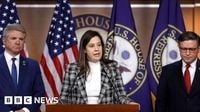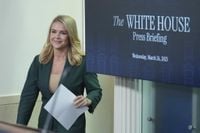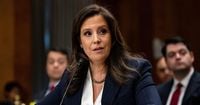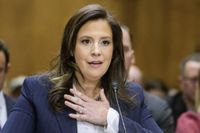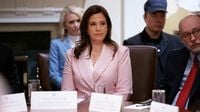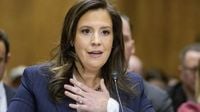President Donald Trump announced on Thursday, March 27, 2025, that he is withdrawing Rep. Elise Stefanik’s nomination to be the U.S. ambassador to the United Nations. This decision marks a significant turnaround for the Cabinet pick, especially after her confirmation had been stalled for months due to concerns about the tight margins among Republicans in the House of Representatives.
Trump confirmed the withdrawal in a post on Truth Social, stating, "It is essential that we maintain EVERY Republican Seat in Congress." He emphasized the need for unity, saying, "We must be unified to accomplish our Mission, and Elise Stefanik has been a vital part of our efforts from the very beginning. I have asked Elise, as one of my biggest Allies, to remain in Congress." The abrupt decision reflects growing anxiety among House Republicans, particularly under the leadership of Speaker Mike Johnson, about their slim majority ahead of two special elections in Florida.
The stakes are high, as the loss of even a few seats could shift the House majority to Democrats, potentially derailing Trump’s legislative agenda. Johnson praised Stefanik, the former No. 4 House leader, as "selfless" and "patriotic," asserting that her decision to withdraw her nomination would allow Republicans to retain a crucial member in Congress. He added that he would invite her to return to the leadership table, although it remains unclear what position she would take since there are currently no vacancies.
Stefanik’s nomination had initially advanced out of committee in late January 2025, and she was viewed as one of the least controversial picks for the Cabinet. However, her confirmation hung in limbo as House Republicans grappled with their narrow margin of 218 to 213 seats, with four vacancies currently in the chamber. The upcoming special elections in Florida are particularly critical, as both districts have historically been Republican strongholds. Trump won both by more than 30 points in the 2024 presidential election.
House Minority Leader Hakeem Jeffries criticized the withdrawal, suggesting that it was a sign of fear among Republicans regarding the special elections. He stated, "The Republican agenda is extremely unpopular, they are crashing the economy in real time and House Republicans are running scared. What happened to their so-called mandate?"
Stefanik is the fourth nominee from the Trump administration who has not successfully navigated the confirmation process. Previous withdrawals included former U.S. Rep. Matt Gaetz for attorney general, Chad Chronister for the Drug Enforcement Administration, and Dr. David Weldon for the Centers for Disease Control and Prevention. The former congresswoman has been in a state of limbo for months, unable to fully engage in her duties as a member of Congress or participate in U.N. activities.
The vacancy of a permanent U.S. ambassador comes at a critical time, as world leaders are discussing significant global issues, including the ongoing conflicts in Ukraine and Israel. In late February, the U.S. mission, under Trump, diverged from its European allies by refusing to blame Russia for its invasion of Ukraine during votes on three U.N. resolutions.
During this transitional period, Dorothy Shea, the deputy U.S. ambassador to the U.N., has represented America’s mission in New York. Stefanik’s withdrawal comes after she had launched a farewell tour of her district, thanking supporters and reflecting on her time in Congress. Her last Instagram post, which included throwback images from her political career, was made on the same day as the announcement, highlighting the suddenness of Trump’s decision.
As the political landscape shifts, the implications of Stefanik's withdrawal are being felt not only in her district but across the Republican Party. The concern over maintaining congressional seats has intensified, especially with the Democrats investing heavily in the upcoming elections. Trump’s decision to keep Stefanik in Congress is seen as a strategic move to bolster his party's position, as he aims to maintain his agenda amid growing opposition.
In the broader context, the ongoing political maneuvers reflect a party grappling with its identity and strategy in the face of potential electoral setbacks. With the special elections just days away, both parties are ramping up their efforts to secure victories that could define the balance of power in the House.
As the situation develops, it remains to be seen how this decision will impact the Republican Party's cohesion and its ability to push through Trump’s policies in a divided Congress. The urgency of the upcoming elections looms large, and the stakes are higher than ever for both sides as they prepare for what could be a pivotal moment in American politics.
